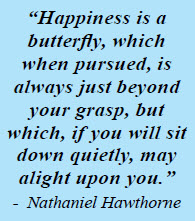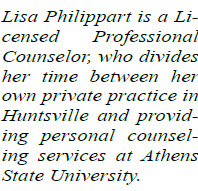“If You’re Happy And You Know It”
 By: Lisa Philippart
By: Lisa Philippart
In both my private practice and at Athens State, I often hear the phrase, “I just want to be happy.” The pressure in our society today to always feel happy can be particularly intense for those living with depression or anxiety. We don’t want to simply count our blessings and be satisfied. The definition of happiness has been extended to include finding deep meaning and fulfilling our purpose in life. At the core of “being” happy is the desire to thrive. After all, we know that happiness is a predictor of health and longevity. If you struggle with mood disorders or stress, it is easy to ignore the good and focus on the bad. Or not see the good at all. This can lead to a habit of cognitive distortions, which are thinking patterns that reinforce negative thoughts or behaviors. If we define happiness as the freedom to experience life the way you choose, then we can move toward recognizing the emotional discomfort that accompanies our periods of unhappiness. For example, maybe you were never given any tools growing up to deal with negative emotions. So, you developed a social reward system based on being positive and present for others. Unfortunately, this strategy often suppresses your own needs.


One approach to cultivating happiness is to focus more on the future than the past. If you begin by thinking about how you want to feel in a couple of months from now, you can come up with some sort of goal you want to achieve. Then, focus on how you will feel when you achieve that goal. The idea is that when you go to the happy emotions in your head, they will change your mindset in that present moment. And the more you live in that mindset, the more you will attract experiences that support it. Therefore, happiness is tied to being in the present moment. The objective becomes less about the pursuit of happiness and more about the moments that are normal or even less desirable, which can then deepen the recognition of those positive emotions related to happiness: joy, gratitude, calmness, contentment, hope, inspiration, and love. Being able to name these emotions helps us to pause and reflect on the many uplifting moments of our day that usually go unappreciated.

Gratitude journaling has become popular in recent years as a way to boost happiness. In my opinion, writing in a gratitude journal daily may not be the best plan because it can become stale and may even end up “desensitizing” you to the things for which you are grateful. It may be better to write down once a week, before bed, three positive events. This needs to be done regularly to establish the habit, but over time you become better at noticing the good things that happen to you. Which is the point… you become happier over time and through incremental modifications. Lasting happiness is not produced through one huge life-changing event. It is the small, regular mental and behavioral changes that end up being the most effective. Can you guess what has been determined to be the biggest factor that contributes to our happiness? A Harvard Study of Adult Development, which has been tracking issues of aging to learn more about what leads to health and happiness, has determined that close relationships by far have the most influence on our ability to be happy — more than money, fame, social class, IQ, or power. Our relationships protect us the most from life’s challenges.
Let me conclude with some suggestions on how to increase the amount of happiness in your life. First, magnify a positive experience. This can be as simple as eating an ice cream cone slowly, savoring the flavors, instead of gobbling it down. Second, avoid suppression. Stop trying to hide the negatives and accept that life brings with it the good and the bad. Third, take time daily to meditate or pray. This can create space between the negatives and your reactions to the negatives. And finally, know your gifts. Do what you are good at and you feed your soul something it craves and needs.
By: Lisa Philippart
Licensed Professional Counselor